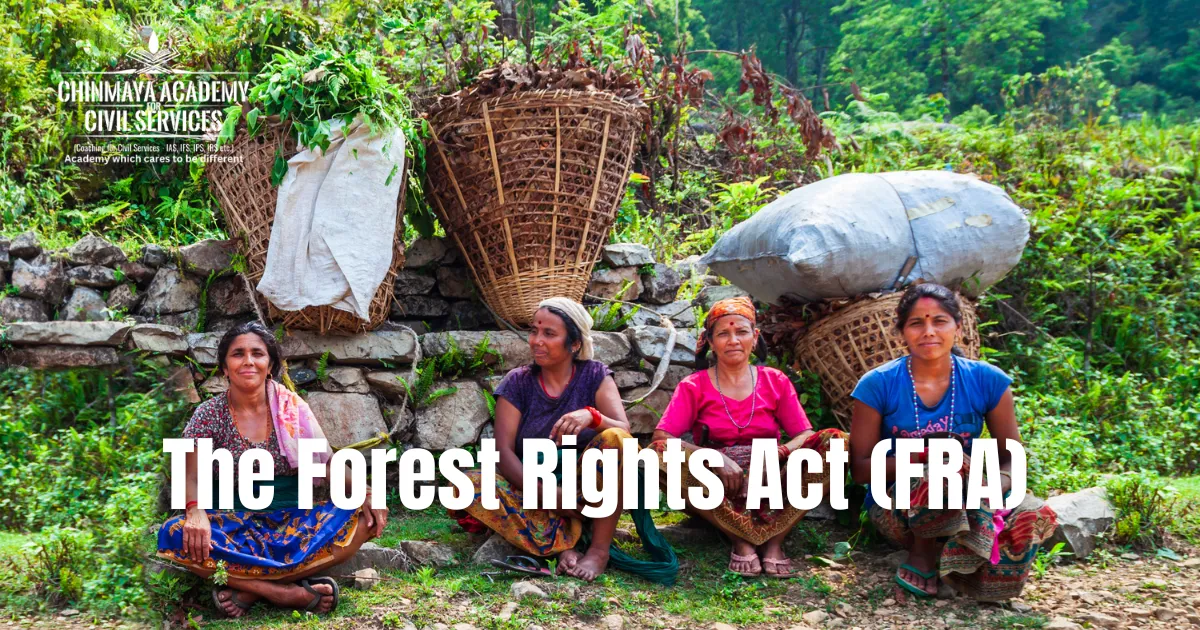
The Forest Rights Act (FRA) – This landmark legislation, officially known as the Scheduled Tribes and Other Traditional Forest Dwellers (Recognition of Forest Rights) Act, 2006, is a crucial piece of Indian forest law. It aims to address the historical injustices faced by tribal and other traditional forest-dwelling communities by recognizing their rights over the forest lands and resources they have depended on for generations.
What it does
Recognizes and vests individual rights:
- The Act grants individual rights to tribal and other traditional forest dwellers over land they have cultivated for years.
- This includes the right to ownership, use, and inheritance.
Empowers communities:
- It empowers communities to manage and protect their traditional forest areas through Gram Sabhas (village assemblies) and Community Forest Rights (CFRs).
- CFRs give communities the right to use, manage, and conserve forest resources for their livelihood needs.
Restitution of rights:
- The Act provides for the restitution of rights that were illegally taken away from forest dwellers in the past.
Conservation focus:
- While recognizing rights, the Act also emphasizes the importance of conservation and sustainable use of forest resources.
- It mandates Gram Sabhas to prepare and implement Community Forest Management Plans.
Significance
Empowerment and justice for marginalized communities:
- The FRA is seen as a major step towards securing the rights and livelihoods of millions of tribal and other traditional forest dwellers who have been historically marginalized and dispossessed of their lands and resources.
Sustainable forest management:
- By involving local communities in forest management, the Act promotes participatory and sustainable forest management practices, potentially contributing to better conservation outcomes.
Challenges and implementation:
- Despite its significance, the implementation of the FRA has faced challenges due to bureaucratic hurdles, lack of awareness, and conflicting interests.
UPSC Relevance:
- Covered under GS Paper-III (Environment & Ecology) and GS Paper-IV (Ethics, Integrity & Aptitude).
- Questions can focus on:
- Significance of the Act, its provisions, and challenges in implementation.
- Impact on forest conservation, tribal livelihoods, and social justice.
- Role of Gram Sabhas and CFRs in sustainable forest management.
- Conflicts and potential solutions regarding conservation and livelihood needs.
- Why in NEWS
- Implementation progress: Different states are at varying stages of implementing the Act, and news articles be reporting on successes and challenges faced in specific regions. For example, Odisha recently completed distribution of individual forest rights titles, while other states like Madhya Pradesh are grappling with delays and discrepancies.
- Policy changes*: Proposed amendments or modifications to the Act can spark debate and attract media attention. For instance, recent discussions focused on the Forest (Conservation) Rules, 2022, and their potential impact on community rights and forest access.
 Chinmaya IAS Academy – Current Affairs Chinmaya IAS Academy – Current Affairs
Chinmaya IAS Academy – Current Affairs Chinmaya IAS Academy – Current Affairs
